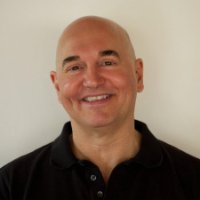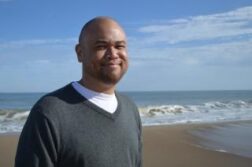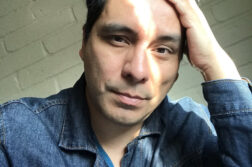FOR MORE than three decades, John-Manuel Andriote has been a critical voice on hiv-aids in such periodicals as The Advocate and The Washington Post. In 1999, he published Victory Deferred: How AIDS Changed Gay Life in America, his landmark book on the LGBT community’s transformation from disenfranchised isolation into a self-affirming political and social force even while grappling with illness, death, and bigotry.
 His latest book, Stonewall Strong, is a hybrid memoir and historical narrative chronicling his own and the LGBT community’s struggles with trauma and resiliency. Andriote illuminates pivotal periods in LGBT history, from the Mattachine Society’s striving for assimilation in the 1950s to Gay Liberation in the ’70s, the devastation of AIDS, and the struggle for marriage equality. The experiences of some of the men and women in these movements exemplify the spirit of resiliency that Andriote wants to document. Framing the historical sections are Andriote’s personal reflections, analyses of research, and interviews with LGBT people who have overcome the effects of childhood abuse, stigma, addiction, depression, and suicide as they move toward self-acceptance, building supportive communities, and achieving wholeness through resiliency.
His latest book, Stonewall Strong, is a hybrid memoir and historical narrative chronicling his own and the LGBT community’s struggles with trauma and resiliency. Andriote illuminates pivotal periods in LGBT history, from the Mattachine Society’s striving for assimilation in the 1950s to Gay Liberation in the ’70s, the devastation of AIDS, and the struggle for marriage equality. The experiences of some of the men and women in these movements exemplify the spirit of resiliency that Andriote wants to document. Framing the historical sections are Andriote’s personal reflections, analyses of research, and interviews with LGBT people who have overcome the effects of childhood abuse, stigma, addiction, depression, and suicide as they move toward self-acceptance, building supportive communities, and achieving wholeness through resiliency.
Andriote contributed a piece based on his book to the March-April 2017 issue of this magazine. The following interview was conducted via email last November.
John Killacky: Thank you for your perceptive new book, whose central theme concerns the resiliency of gay men. How did you come to this thesis?
John-Manuel Andriote: As a health reporter, I’ve long been interested in mental health. I spent many years in therapy and Al-Anon programs working to understand how my life’s traumas had shaped me, even undermined me at times. As I read and wrote about resilience for The Atlantic and Huffington Post, I realized that what I had learned on the subject would be of benefit to others, particularly other gay men. I discovered in my research and interviews that most gay men are astonishingly resilient considering the bullying, rejection, and other traumas they experience. I wanted to “bottle” what I was learning and share it with others who could apply it in their own lives to help themselves work through challenging experiences.
JK: In the book, you write that “Fighting the stigma inside ourselves, self-stigma, is the challenge facing every gay man.” Could you talk about this a bit more?
J-MA: When we let our bullies, detractors, and haters define us and internalize their warped definitions of who we are and what our being gay “means” (always something bad), we become our own worst enemy. In contrast, we become powerful when we reject their definitions of us and instead choose to define ourselves. We have a whole new, positive experience of being gay when we seize control of the story and make ourselves the story’s hero rather than its victim.
JK: In researching this book, you talked to nearly 100 LGBT luminaries. Do tell, who were the most fun and the most difficult?
J-MA: What I found in talking with people about this very personal subject is that, for many of them, our conversation was the first time they had reflected on their own resilience. The interviews felt very intimate to me and offered insights into the interior lives of some very public figures, such as Barney Frank, Bishop Gene Robinson, the Episcopal Church’s first openly gay bishop, and now-retired U.S. Ambassador Michael Guest, the first openly gay man confirmed as an ambassador, who was appointed by George W. Bush.
Larry Kramer has a reputation for being “difficult,” but in the three interviews I’ve done with him over the last twenty years, I’ve always found him to be a very gentle and tender person. Part of my approach in interviewing public figures like Larry is to find the thing that makes them tick, the thing that drives their work and makes them succeed. In Larry’s case, I recognized early on that his public anger was driven by the deep pain of seeing his friends die from AIDS in the early years of the epidemic, when the government didn’t seem to care and even many gay men didn’t want to be too close to the “gay plague” because of the stigma attached to HIV. So, I always focused on the man I saw within Larry, and I was deeply touched by our interviews.
Evan Wolfson was fascinating to interview, not only because he is a legendary activist who single-mindedly pushed for legal same-sex marriage for three decades, but also because of his deep sense of justice and belief in America’s promise of equal justice for all. Like the other men I interviewed, Evan responded with real concern for younger gay men when I asked him what he would say to a young gay boy about the historic events he has shaped and witnessed. “You are part of a community that has offered the most resonant, inspiring movement in decades,” he would tell the boy. “You are part of the community that has helped America to become a more perfect union and has offered the most inspiring example of belief in what America stands for at its best.”
JK: I particularly appreciated your opening chapters on experiences from your life that challenged you to find your own resiliency. As a journalist, was it difficult to delve into the first-person singular so deeply?
J-MA: Learning to write about my own experiences, especially the traumatic ones I describe in part one of Stonewall Strong, was challenging. I certainly cried a lot as I recalled my life’s traumas described in my own contemporaneous accounts of these experiences in my journals. But I persisted, because what I learned from my 2006 HIV coming-out story is that my readers frequently told me that they found their own experiences affirmed and gained new insight into themselves by reading my account. Writing Stonewall Strong has been deeply healing for me personally, as I have revisited these difficult times of my life and taken the opportunity, in writing about them, to connect the dots and trace the timeline of my own resilience and growth.
JK: I haven’t read your Hot Stuff: A Brief History of Dance/Disco Music, but I love your children’s book with illustrator Katie Runde, Wilhelmina Goes Wandering, about a runaway cow. Your writing profile is certainly expansive. So, what’s next for you?
J-MA: As for a next book, I have already shared with my editor at Rowman & Littlefield my interest in reviving a book proposal I developed but put aside in the early 2000s, focused on aging. I don’t know whether it will focus only on gay people, though what we know about aging—which is actually a lot—will certainly be included. I mainly want to explore how, as with writing in Stonewall Strong about resilience, aging well is largely about framing our stories of aging in positive terms rather than the more typical negative ones all around us in our ageist culture and gay subculture. My working title on the original proposal was “Halcyon Days,” after Walt Whitman’s poem of that name, in which he celebrates old age as life’s very quintessence. He uses the image of a ripe apple to say that the older years are the rich time of harvest as we savor the sweetness that remains after life has tested and tried us—and delivered us, hopefully safely and intact, to this next season of our lives.






